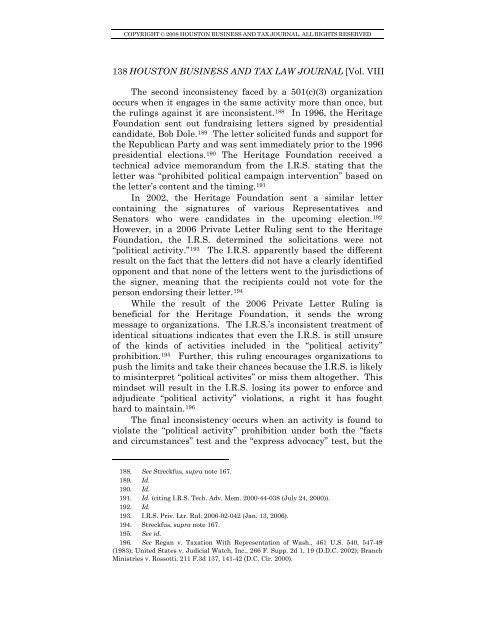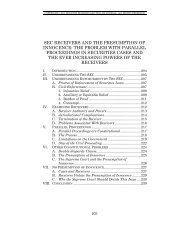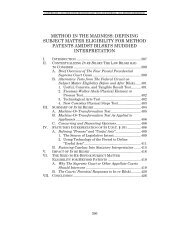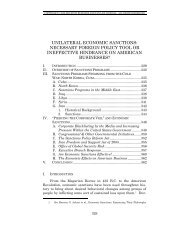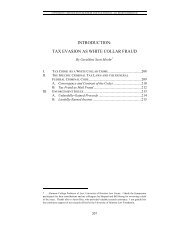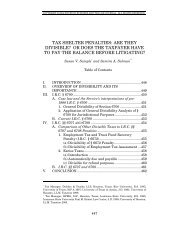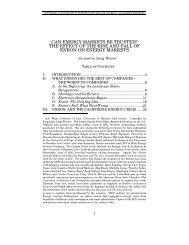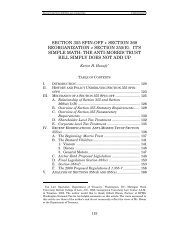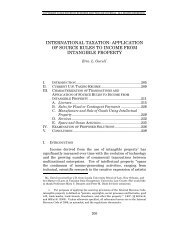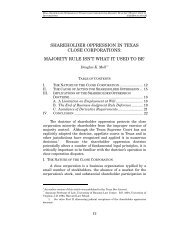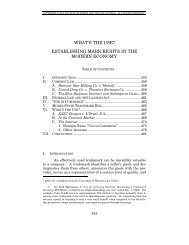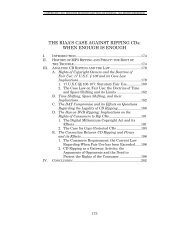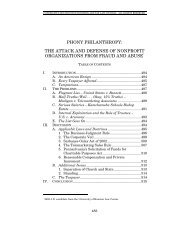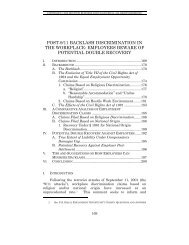Eyes Wide Shut: The Ambiguous ?Political Activity? - Houston ...
Eyes Wide Shut: The Ambiguous ?Political Activity? - Houston ...
Eyes Wide Shut: The Ambiguous ?Political Activity? - Houston ...
You also want an ePaper? Increase the reach of your titles
YUMPU automatically turns print PDFs into web optimized ePapers that Google loves.
COPYRIGHT © 2008 HOUSTON BUSINESS AND TAX JOURNAL. ALL RIGHTS RESERVED<br />
138 HOUSTON BUSINESS AND TAX LAW JOURNAL [Vol. VIII<br />
<strong>The</strong> second inconsistency faced by a 501(c)(3) organization<br />
occurs when it engages in the same activity more than once, but<br />
the rulings against it are inconsistent. 188 In 1996, the Heritage<br />
Foundation sent out fundraising letters signed by presidential<br />
candidate, Bob Dole. 189 <strong>The</strong> letter solicited funds and support for<br />
the Republican Party and was sent immediately prior to the 1996<br />
presidential elections. 190 <strong>The</strong> Heritage Foundation received a<br />
technical advice memorandum from the I.R.S. stating that the<br />
letter was “prohibited political campaign intervention” based on<br />
the letter’s content and the timing. 191<br />
In 2002, the Heritage Foundation sent a similar letter<br />
containing the signatures of various Representatives and<br />
Senators who were candidates in the upcoming election. 192<br />
However, in a 2006 Private Letter Ruling sent to the Heritage<br />
Foundation, the I.R.S. determined the solicitations were not<br />
“political activity.” 193 <strong>The</strong> I.R.S. apparently based the different<br />
result on the fact that the letters did not have a clearly identified<br />
opponent and that none of the letters went to the jurisdictions of<br />
the signer, meaning that the recipients could not vote for the<br />
person endorsing their letter. 194<br />
While the result of the 2006 Private Letter Ruling is<br />
beneficial for the Heritage Foundation, it sends the wrong<br />
message to organizations. <strong>The</strong> I.R.S.’s inconsistent treatment of<br />
identical situations indicates that even the I.R.S. is still unsure<br />
of the kinds of activities included in the “political activity”<br />
prohibition. 195 Further, this ruling encourages organizations to<br />
push the limits and take their chances because the I.R.S. is likely<br />
to misinterpret “political activites” or miss them altogether. This<br />
mindset will result in the I.R.S. losing its power to enforce and<br />
adjudicate “political activity” violations, a right it has fought<br />
hard to maintain. 196<br />
<strong>The</strong> final inconsistency occurs when an activity is found to<br />
violate the “political activity” prohibition under both the “facts<br />
and circumstances” test and the “express advocacy” test, but the<br />
188. See Streckfus, supra note 167.<br />
189. Id.<br />
190. Id.<br />
191. Id. (citing I.R.S. Tech. Adv. Mem. 2000-44-038 (July 24, 2000)).<br />
192. Id.<br />
193. I.R.S. Priv. Ltr. Rul. 2006-02-042 (Jan. 13, 2006).<br />
194. Streckfus, supra note 167.<br />
195. See id.<br />
196. See Regan v. Taxation With Representation of Wash., 461 U.S. 540, 547-49<br />
(1983); United States v. Judicial Watch, Inc., 266 F. Supp. 2d 1, 19 (D.D.C. 2002); Branch<br />
Ministries v. Rossotti, 211 F.3d 137, 141-42 (D.C. Cir. 2000).


